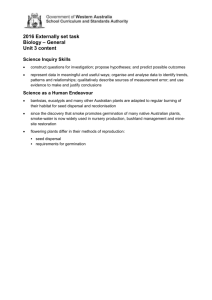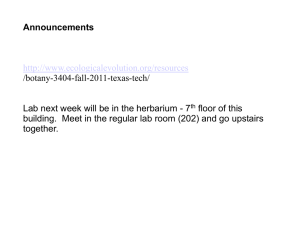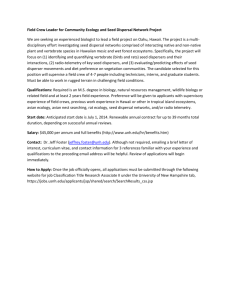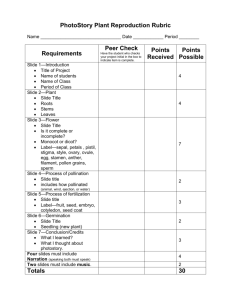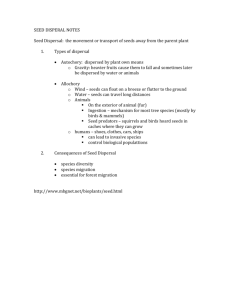Early Stage Researcher person specification
advertisement
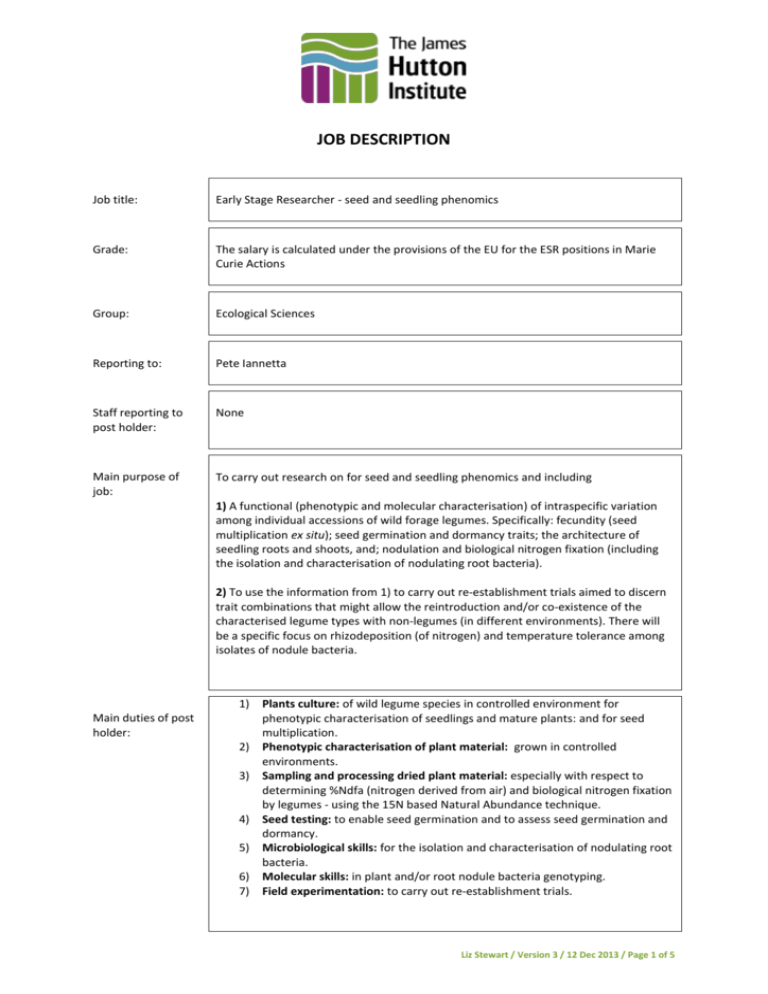
JOB DESCRIPTION Job title: Early Stage Researcher - seed and seedling phenomics Grade: The salary is calculated under the provisions of the EU for the ESR positions in Marie Curie Actions Group: Ecological Sciences Reporting to: Pete Iannetta Staff reporting to post holder: None Main purpose of job: To carry out research on for seed and seedling phenomics and including 1) A functional (phenotypic and molecular characterisation) of intraspecific variation among individual accessions of wild forage legumes. Specifically: fecundity (seed multiplication ex situ); seed germination and dormancy traits; the architecture of seedling roots and shoots, and; nodulation and biological nitrogen fixation (including the isolation and characterisation of nodulating root bacteria). 2) To use the information from 1) to carry out re-establishment trials aimed to discern trait combinations that might allow the reintroduction and/or co-existence of the characterised legume types with non-legumes (in different environments). There will be a specific focus on rhizodeposition (of nitrogen) and temperature tolerance among isolates of nodule bacteria. 1) Main duties of post holder: 2) 3) 4) 5) 6) 7) Plants culture: of wild legume species in controlled environment for phenotypic characterisation of seedlings and mature plants: and for seed multiplication. Phenotypic characterisation of plant material: grown in controlled environments. Sampling and processing dried plant material: especially with respect to determining %Ndfa (nitrogen derived from air) and biological nitrogen fixation by legumes - using the 15N based Natural Abundance technique. Seed testing: to enable seed germination and to assess seed germination and dormancy. Microbiological skills: for the isolation and characterisation of nodulating root bacteria. Molecular skills: in plant and/or root nodule bacteria genotyping. Field experimentation: to carry out re-establishment trials. Liz Stewart / Version 3 / 12 Dec 2013 / Page 1 of 5 PERSON SPECIFICATION Essential Desirable Attainments: Education / qualifications There are four essential criteria A Master Degree, or an equivalent qualification in plant and environmental sciences, or a related discipline Specific qualifications in experience in wild plant and seed science Have no-more than 4 years of research experience from the time of their graduation Must not have resided or worked within the UK within the three years prior to their deadline of their application Experience: Growing plants in controlled-glasshouse environments and field environments. Characterisation of wild plant functional traits: especially wild legumes. Seed testing: of germination and dormancy. Sampling and processing plant material for analytical chemistry based methods Microbiological skills: for the isolation and characterisation of nodulating root bacteria. Molecular skills: in plant and/or root nodule bacteria genotyping Skills: Technical Wild plant ecology and native seed science (wild plant culture and seed testing) Skills in molecular biology (plant and microbial) and plant phenotyping Written communication Experience of report writing Scientific writing for peer-review Verbal communication Experience of delivering presentations Experience in giving presentations to peers at international scientific meetings Management Evidence of working effectively with a team Specific training in leadership Interpersonal Evidence of be tolerance and flexibility Evidence of leading a research team Administrative Excellent record keeping (lab book) and data recording Statistics skills Leadership Evidence of leading by example. Evidence of setting and achieving team goals. Motivation Evidence of strong interest in restoration Why would they want this job? - A Liz Stewart / Version 3 / 12 Dec 2013 / Page 2 of 5 and conservation of/with wild plants e.g. evidence of their experience and/ or success in this career to date. justification which might support the possibility that the candidate will be dedicated to this area of research in the long-term Other skills (please specify) Other requirements (please specify) The successful candidate will be based within the Agroecology Group of Ecological Sciences at the James Hutton Institute (Dundee site), as a ‘Marie Curie Research Fellow’. This prestigious appointment forms important component of a European Union-Marie Curie funded ‘Initial Training Network called ‘NAtive Seed Science, TEchnology and Conservation’, (NASSTEC). This is also a ‘mobility fellowship’. Applications for this post will accepted from researchers of all nationalities, applicants wishing to work within the UK must be entitled to do so before they can be employed. NASSTECs aim is to ensure that future environmental mitigation and adaptation projects which utilise wild native species can have increased impact. Towards that end, this position will integrate knowledge in geobotany, seed biology and agricultural botany via a state-of-the-art research programme in native seed science and conservation. The successful candidate will therefore be expected to register for a PhD at the University of Pavia (Italy), and to their “Experimental Ecology and Geobotany” PhD programme. The NASSTEC scientific and training network embraces a total of 11 projects, and each project will reside within one of three sub programmes: A, In-situ seed sampling (3 projects); B, Seed biology characterisation (4 projects), and; C, Production and deployment of seed (3 projects). This post-serves sub-category A, and the main duties will involve sampling (F1) seeds from wild species found across range of different pedoclimatic conditions across altitudinal and latitudinal transects (across Europe). F1 seed will be assessed for their germination and dormancy characteristics ex situ and to generate an F2 seed population from which plants (seedlings and mature plants), may be characterised for their functional attributes. Signature of line manager: Science/BES Group Leader signature: Liz Stewart / Version 3 / 12 Dec 2013 / Page 3 of 5
